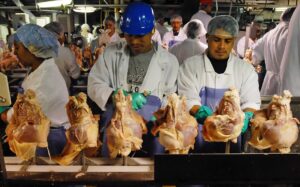
For many years, meat and poultry workers, together with a broad coalition of workers’ rights and civil rights groups from across the country, have continued a concerted effort to highlight the industry’s dangerous conditions and the all-too-common permanently disabling injuries that come from crippling work speeds.
Oxfam America – together with these allies – began a poultry worker justice campaign to increase public pressure as well. Many of you have participated in that campaign by signing petitions, lifting up and sharing stories, and contacting your federal representatives and senators.
Wednesday, Tyson Foods, the country’s largest poultry company, took a first, small step in response to these efforts. Tyson – which received public attention last year for its plants averaging one amputation per month – recently installed a new CEO and senior management team. The new leadership has announced Tyson’s intent to improve conditions for its poultry workers.
Workers and the public know the urgent need for fundamental changes in this industry. As we’ve documented, an extensive number of reports, surveys, investigative journalism series, and medical and epidemiological studies have revealed the extremely dangerous and degrading conditions in meatpacking and poultry plants.
These include:
- impossibly fast work speeds,
- little-to-no bathroom access,
- improper medical treatment of work-related injuries,
- lack of sufficient training,
- limited-or-no rest breaks,
- low wages,
- and a lack of worker engagement and representation.
No one should suffer permanent injuries simply for doing their job, and everyone should be able to go home safe to their family after a day’s work. Worker and public pressure have led to this initial announcement by Tyson, and we appreciate this new direction and commitment to transparency around third-party audits that examine worker treatment and voice. But, as Magaly Licolli, executive director of the Northwest Arkansas Workers’ Justice Center, said Wednesday:
“In the end, it doesn’t matter how many words the company says. We listen to the workers, and we believe what they say. They’re the ones who tell us what’s really happening inside the plants. We look forward to holding the company accountable.”
